Columns
- SLPP raises issue during Joint Strategic Committee over elections
- President Wickremesinghe thereafter makes a statement to ministers
- Assures he will hold presidential elections first
- Developments came after dinner discussion by government MPs
- Basil rubbishes Udayanga’s remarks about dissolution of Parliament, says there is no truth in his claims
By Our Political Editor
Within hours of his announcement, the Election Commission gave the go-ahead to District Secretaries, who function as Returning Officers in different districts, to embark on arrangements. This was after the Treasury informed him that funds had been allocated for a presidential election. “Ten billion rupees have been set aside by the Treasury,” R.M.A.L. Ratnayake, Election Commission chairman told the Sunday Times. These funds, he said, are meant only for the presidential election and will be drawn in stages based on necessity. He made clear no funds have been made available for any other election.
As reported in these columns last week, despite wild speculation, some doctored and others engineered by individuals or interested groups, the clamour for an immediate parliamentary election had died down or is even dead. The reason: for many weeks now, President Wickremesinghe, who is empowered constitutionally to dissolve Parliament—which has now completed the required two and half years—wants a presidential election first. True, it was the result of a request made by Basil Rajapaksa, the founder of the Sri Lanka Podujana Peraumna (SLPP). In the later weeks, however, SLPP leader and onetime President, Mahinda Rajapaksa, made clear his party was ready to face either a presidential or a parliamentary election.
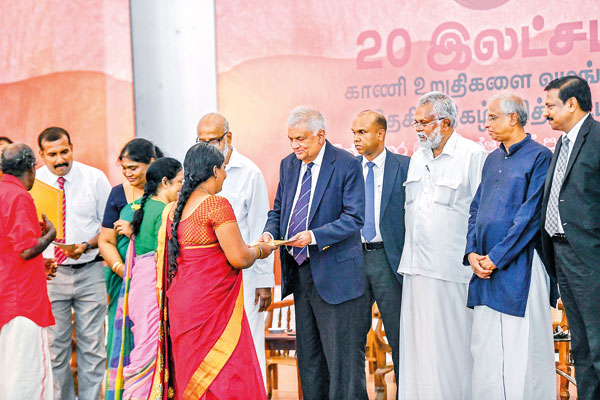
President Wickremesinghe in Jaffna, distributing freehold land deeds to northern residents
This notwithstanding, the issue gained credence once again after a close relative of the Rajapaksa family, Udayanga Weeratunga, declared in an interview posted on YouTube that President Wickremesinghe would dissolve Parliament on June 15 to pave the way for a general election. In other words, a general election would come first. The interviewer’s video footage appears regularly on this social media channel and is also distributed. The former Sri Lanka Ambassador to Russia, who had previously run a Sri Lanka eatery in the Ukrainian capital of Kiev, revealed that he had worked earlier for the KGB, the now-dissolved Soviet Union’s intelligence arm. It has now been replaced by Russia’s FSD. Weeratunga claimed that was how he got to know most things. He was not shy to say he was a KGB informant. If indeed the claim is true, it warrants a probe. This shows how much commitment he has had for his own country.
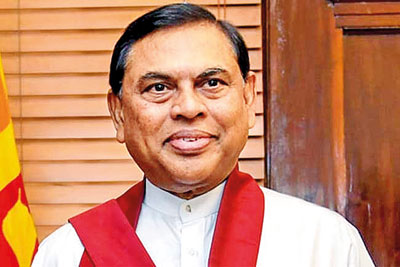
Basil Rajapaksa: Ready to face any election
His relationship with the Rajapaksa family gave him an air of credibility. He threw their names every now and then. The gullible swallowed his remarks hook, line and sinker. For them, it was authoritative enough to not only conclude that a dissolution of Parliament would come first but spread the word around about the newfound gospel. Weeratunga’s claim was rubbished by Basil Rajapaksa. He told the Sunday Times, Remarks by Weeratunga about a dissolution of Parliament were a figment of his imagination. He said he did ask President Wickremesinghe to consider conducting parliamentary elections first. “That was only a suggestion. That was done weeks earlier and we did not pressure him. . Since then, we are prepared for any election and have geared our party machinery for it,” he revealed. Evidently, unaware of developments, the interviewer asked Weeratunga “whether President Wickremesinghe is trying to bring Basil Rajapaksa (into the government)?” He replied, “I don’t think it will happen now.” The interviewer: “Now the meetings between Basil and Ranil are not taking place?” Weeratunga: “They are taking place.”
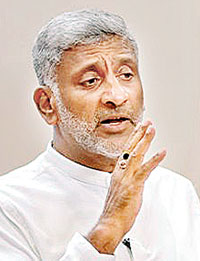
Prasanna Ranatunga: Steers a key party meeting on the elections
Separately at a news conference at the party headquarters in Battaramulla, SLPP General Secretary Sagara Kariyawasam declared that when it came to a general election, the President could dissolve Parliament at any time once it had completed two and half years of its term. “That power is vested with the President and not us. As a party, our founder Basil Rajapaksa has clearly stated that it would be better to hold a parliamentary election first, but that decision lies with the President. Whatever he decides, we are ready to face any election, whether it is the presidential, parliamentary, local government or provincial council elections. We have expressed our view that it is better to hold a parliamentary election first, but we have not made an official request to the President nor made it a condition.
“On the SLPP’s presidential candidate, it is wrong to say we don’t have a (presidential) candidate. We have several candidates. All other parties have only one. They are all tied to the candidates they named two or three years ago. We will present the best candidate at the right time.”
Asked whether the SLPP would support Wickremesinghe’s presidential candidacy he replied, “It was the SLPP that made Ranil Wickremesinghe, whose party had only one seat in Parliament, the President. We supported all bills that he presented to Parliament over the past two years. Our agreement with him was that we would support him to govern the country during the period remaining in Gotabaya Rajapaksa’s presidency. But our party needs to take a decision on its presidential candidate going forward.”
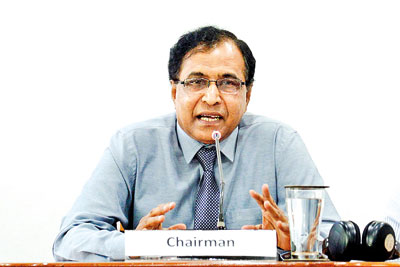
Election Commission Chief R.M.A.L. Ratnayake: Rs. Ten billion has been set aside by the Treasury
How then did President Wickremesinghe choose to make a statement to the Cabinet of Ministers on Tuesday that the presidential elections would come first? The chronology of events speaks for itself. At the highest levels of the SLPP, there has been concern, as pointed out in these columns last week, over three main issues:
(1) The SLPP is formally unaware whether Ranil Wickremesinghe will be a presidential candidate. He has made no formal declaration to this effect so far.
(2) We do not know formally whether a presidential election would come first or it will follow a parliamentary election.
(3) For more than 25 years, the SLPP members have bitterly opposed Wickremesinghe. Hence, they would need at least 45 days before the presidential poll to formulate plans to support him. If indeed there were those who opposed the move, they would have to be given an opportunity to express their views.
“Ministers, Deputy Ministers, State Ministers and SLPP parliamentarians were invited to dinner on Monday night to discuss these issues,” Urban Development and Housing Minister Prasanna Ranatunga told the Sunday Times.Together with former minister, Mahindananda Aluthgamage, he steered the meeting where there was an expression of support for Wickremesinghe. If the mood was adverse, at least two different SLPP parliamentarians said, the meeting would have “moved in a different direction.” It would have even led to the adoption of a resolution, as provided for in the Constitution, calling upon the President to dissolve Parliament and go for a general election. The dinner was held at the Water’s Edge, a hotel complex that came under the charge of the Urban Development Authority. A strong backer for Wickremesinghe was State Minister Sita Arambewela. There was a minor scuffle between Prasanna Ranaweera and Lohan Ratwatte, both state ministers. It came after the latter raised issue over the alleged involvement of Ranaweera in an incident at the Bandaranaike International Airport. He said it reflected badly on all parliamentarians. Ranaweera shot back that even the incident at the Anuradhapura prisons where Ratwatte allegedly brandished a pistol at an inmate was also bad for parliamentarians.
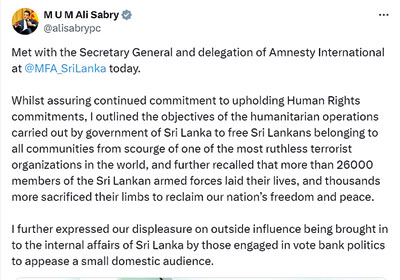
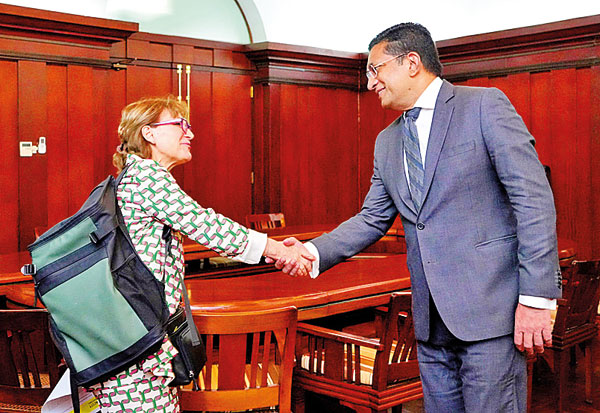
Foreign Minister Ali Sabry greeting the visiting Amnesty International Chief Agnes Callamard
Both Ranatunga and Aluthgamage briefed the SLPP leadership on the outcome of their dinner discussion. They decided that they would raise the issue when the Joint Strategic Affairs Committee met the next day, Wednesday. Taking part in the discussion were President Wickremesinghe, Sagala Ratnayake, Manusha Nanayakkara, Harin Fernando, Presidential Secretary Saman Ekanayake, Basil Rajapaksa, Kanchana Wijesekera and Nimal Siripala de Silva. Conspicuous by his absence was Nimal Lanza, leader of the New Alliance. It was tasked by Wickremesinghe to win over SLPP MPs to the UNP fold.
It was Basil Rajapaksa who briefed the committee on the details of the discussion at the dinner at Waters Edge. He elaborated on the three issues that were discussed and the backing that the SLPP parliamentarians gave. He told the Sunday Times, “Thereafter, President Wickremesinghe agreed he would tell the Cabinet of Ministers at the weekly Cabinet meeting on Wednesday (the next day) that presidential elections would be held first. He has already fulfilled his pledge. Our party will gear itself for these polls.”
As is clear, Wickremesinghe, however, has still not declared his candidacy. That, however, is no cause for concern, said an SLPP source who did not wish to be identified. This is because the party has already been assured of the presidential election and there was no more uncertainty. Basil Rajapaksa, the founder of the party, and party officials are formulating campaign programmes in different districts.
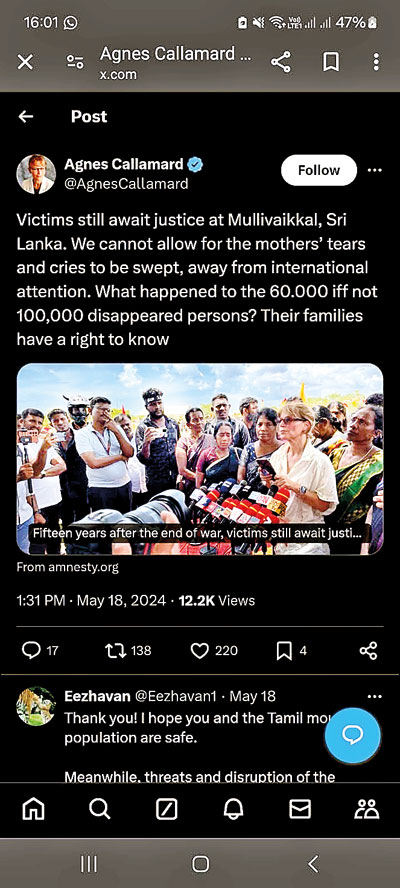
Amnesty International head Agnes Callamard's tweet accompanied by a picture that shows she is addressing a war remembrance day event in Mullivaikkal
Just a week ago, Sri Lanka marked a historic occasion—15 years since the conclusion of the separatist war. It came with the military defeat of the Liberation Tigers of Tamil Eelam (LTTE). Since the end of the armed conflict, except during the period of the Yahapalana government, May 19 has been celebrated by both Mahinda Rajapaksa and Gotabaya Rajapaksa governments as a war victory day with military parades and various celebratory programmes.
Compared to the previous years, this year saw some marked contradictions that reflected badly on those who shed buckets of tears at the UN Human Rights Council about some events giving Sri Lanka a bad image. In addition to this disgraceful distraction, facts and figures were twisted around to create a frightening picture. No one in the government took upon the responsibility of challenging those events or what was presented as facts. The contrasts between the events held in Colombo and Mullaivaikal in Mullaitivu are striking. The narratives were quite different. First, what went on in Colombo.
On May 17, in Colombo, although not by the current government, but various religious and civil organisations came together under the banner of ‘Turning Point’ at the Vihara Maha Devi Park and conducted a memorial event to mourn for all those who perished during the separatist war. The event went through, without any interruption or protests with hardly any police presence. More than two hundred people turned up in person and several joined the livestream on Facebook. At one point, the number of live viewers numbered over two thousand.
The event organisers, the Institute for Democratic Reforms and Electoral Studies (IRES), Darmashakthi Organisation, One Sri Lanka Initiative–YMBA, Sangha for Better Sri Lanka (SBSL) and the United Kingdom-based Global Tamil Forum (GTF) came together for this event.
The event was graced by various foreign diplomats, those from the United Nations, Members of Parliament from various parties, members of various Non-Governmental Organisations, religious leaders from all faiths, and the public.
The event was inaugurated by lighting a single lamp by religious leaders representing the main four religions of the country—Buddhism by Ven. Madampagame Assaji Thera, Hindu by Chandrabose Sharma, Muslim by Mowlavi Mohamed Fairooz and Christianity by Father Asiri Perera. A song originally sung by Pradeepa Dharmadasa, incidentally the wife of Parliamentarian Dullas Alahaperuuma, was sung both in Sinhala and Tamil by musicians.
YMBA President Mahendra Jayasekara said when parents lose their loving children during a war, they will remember them very dearly until their last breath. When that is a natural emotion, trying to suppress that feeling of mourning for their lost children is inhuman. He said, “If we as communities cannot accept our past mistakes, there will never be a reconciled Sri Lanka.”
S.C.C. Elankovan, Chief Executive of the S J V Chelvanayakam Foundation and grandson of the Ilankai Thamil Arasu Katchi (ITAK) late president S J V Chelvanayakam, said, that it was a significant day in the history as this would be the first time that deaths and destructions of war in the north and east has been acknowledged by the people in the south.
The United Nations Peace and Reconciliation Advisor Patrick McCarthy said he has just arrived in Sri Lanka, but he originally was from a country of armed conflict, Ireland, and he came with personal experience of grieving families on both sides of the conflict there. He said that he was encouraged to note that both communities had come together to mourn jointly their dead.
Now to the events held in Mullaivaikal in the Mullaitivu district, a heavily battle-scarred area during the separatist war. The area was decorated with flags and the colours were red and yellow. All one must do is to look at the now militarily defeated Tiger guerrilla flag. It bears the same colours. Who was the veritable chief guest? It was Agnes Callamard, head of Amnesty International. Obviously, the government has given her clearance. One of her main events while in Colombo was a call on Foreign Affairs Minister Ali Sabry. It seemed unusual that she was allowed to meet the Sri Lankan Foreign Minister in his office room at the ministry with a backpack strapped on.
Callamard had ended her sojourn in Sri Lanka and posted the following messages on X, formerly known as Twitter:
The first one on May 18 the Remembrance Day, read “I attended today Mullaivaikal Remembernce Day. Standing in solidarity with all those who have lost loved ones and are demanding answers and justice. Ensuring that Sri Lanka 60 to 100,000 disappeared do not fall off the international agenda. Justice and Truth must be served.”
This is the first time in the history of Sri Lanka’s separatist war that a figure of 60,000 to 100,000 has emerged. Yet none of the state agencies has either reacted to it or raised issue with Amnesty International.
The second one on X said “Victims await justice at Mullaivaikal, Sri Lanka. We cannot allow for the mother’s tears and cries to be swept away from international attention. What happened to the 60,000 if not 100,000 disappeared persons? Their families have a right to know.”
Foreign Minister Sabry also posted a message on X. This is what it said, “Whilst assuring continued commitment to upholding human rights commitments, I outlined the objectives of the humanitarian operations carried out by the government of Sri Lanka to free Sri Lankans belonging to all communities from scourge of one of the most ruthless terrorist organisations in the world, and further recalled that more than 26000 members of the Sri Lankan armed forces laid down their lives, and thousands more sacrificed their limb to reclaim our nation’s freedom and peace.”
Alas, the Sri Lankan Foreign Minister who claimed to have spoken so much about humanitarian operations has not influenced the head of Amnesty International. This is again a clear illustration of the lofty claims in news releases and statements that are exercises in futility. If one needs proof, the Agnes Calamard issue is a good example. They have failed to manage it even on their own turf.
Highly placed SLPP sources said that according to informal assurances, Ranil Wickremesinghe will be a presidential candidate. What is awaited is a formal announcement. “We have no doubt he will make it,” said these sources. This week, he was in the North and one of his main tasks on Friday was to hand over 1,286 freehold land deeds to those in the districts of Kilinochchi, Vavuniya, Mullaitivu and Mannar. In his own way, an election campaign has already begun for Ranil Wickremesinghe.
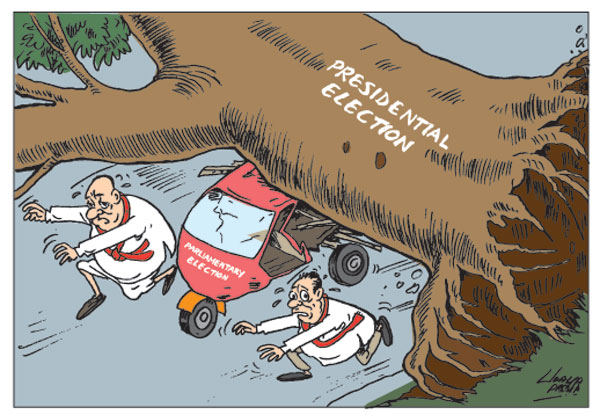
| Govt. to have more legal powers and control of public funds under two new BillsHard on the heels of taking steps to reverse the deteriorating economy, President Ranil Wickremesinghe, on Wednesday introduced two Bills to arm the government with strong legal powers and to control public funds. They were tabled in Parliament by State Minister Shehan Semasinghe. Coming as they do in his capacity as the Minister of Finance, Economic Stabilisation and National Policies, one is titled the Economic Transformation Bill. Its highlight is the setting up of an Economic Commission of Sri Lanka and it will replace the Board of Investment Law. The proposed new law, once approved, will enable the setting up of the Sri Lanka Institute of Economics and International Trade. The other is the Public Financial Management Bill. Its objective is spelt out as “intended to strengthen accountability, Oversight, Management framework with a view to improving Fiscal Policy for better macroeconomic management.” The duties and functions of the Economic Commission have been listed as: (a) to design, recommend and implement national policies regarding investments, and the stimulation of international trade to achieve national economic milestones; (b) to formulate schemes and measures to ensure that existing investors are encouraged to retain, reinvest and expand their investments in Sri Lanka; (c) to take necessary measures to facilitate investments by streamlining, digitising and creating a transparent regulatory and operational environment including a process for the registration and approval of investments; (d) to take necessary measures to ensure that trade negotiations will be directly aligned with Sri Lanka’s strategic export and investment objects and reap the expected benefits of the trade-investment nexus; (e) to propose strategic policy actions that may be required to attract and stimulate transformational investments to the Minister; (f) to recommend the creation of Investment Zones; (g) to undertake periodic performance reviews of investments as well as the flow of investments into Investment Zones; An investment zone, according to the Bill, is to be designated and it will include industries, information, communication technology enterprises, science and technology enterprises, high technology agricultural enterprises, tourist and recreational enterprises, business service enterprises, and livestock enterprises. No investment shall be expropriated or nationalised or no measures shall be taken having equivalent effect of nationalisation or expropriation (hereinafter referred to as “expropriation”) except in the public interest, says the draft Bill. The reasons listed are: (a) on a non-discriminatory basis; (b) on the principle of proportionality; (c) in accordance with due process of law; and (d) accompanied by expeditious payment of adequate and effective compensation. In the case of expropriation- (a) compensation shall amount to a fair market value of the investment expropriated on the day before the expropriation or impending expropriation takes place or becomes publicly known, whichever is earlier, and shall not reflect any change in value occurring because the intended expropriation had become publicly known earlier. Valuation criteria shall be based on going concern value, asset value including declared tax value of tangible property, and other criteria, as appropriate, to determine fair market value. (b) if the market value cannot be ascertained, the compensation shall be determined by taking into account all relevant factors and circumstances, such as the capital invested, the nature and duration of the investment, replacement and book value, in accordance with fair market value as per international standard of valuation; A key highlight of the Public Financial Management Bill is the establishment of a Committee on Cash Flow Management chaired by the Secretary to the Treasury and consisting of Deputy Secretaries, and Heads of the Departments in the Treasury and Heads of revenue departments – Director General of Customs, Commissioner General of Inland Revenue and Commissioner General of Excise. All government cash including money received by public entities is to be deposited and from which expenditure of the government and such public entities shall be made to enable public funds to be managed in a consolidated manner. The draft Bill calls upon the Secretary to the Treasury to within three weeks of the publication of proclamation or Order requiring the holding of a General Election to elect the members of Parliament, cause to be released to the public a pre-election budgetary position report containing information on the fiscal position of the country. Every pre-election budgetary position report shall contain the following information for the current financial year: estimates of revenue and expenditure, estimates of government borrowings, the economic and other assumptions that have been used in preparing such estimates, a statement of risks, quantified where practicable, that may have material effect on the fiscal position. The latter will include liabilities including guarantees and indemnities given by the Government under any Act, publicly announced proposals for spending by the government that have not been included in the estimates, Government negotiations in progress and not finalized, and such other information as may be necessary to reflect fairly the financial position of the government as of the date of the said report.
| |
Buying or selling electronics has never been easier with the help of Hitad.lk! We, at Hitad.lk, hear your needs and endeavour to provide you with the perfect listings of electronics; because we have listings for nearly anything! Search for your favourite electronic items for sale on Hitad.lk today!


Presidential Polls: EC Chief Gets Rs 10 Billion
View(s):